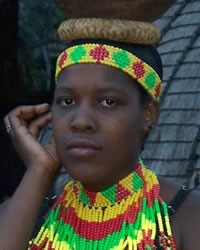Zulu means “sky.” It is also the name of a common ancestor who founded the Zulu royal line in 1670. A hundred years later the Zulus began to transform from a group of loosely affiliated pastoral families to a more organized state. This allowed leaders to wield more power over their subjects and nearby subjugated chiefs. This enabled Zulu leaders to gain more power and wealth through tributes and taxes. They began to raise up conquering armies to increase their wealth and power even further. Military conquerors gained higher status. This process accelerated in the late 1700s when Shaka became a military leader. Shaka conquered and united the Zulu nation, largely because of his advanced military tactics. He recruited and trained more military leaders to expand the Zulu nation even further. Between 1816-1828 Shaka had created one of the most powerful empires on the African continent.
In 1824 the Dutch began to settle in what is now Durban. This settlement consisted of merchants who established a trading station. There were skirmishes with the Zulus who saw this region as their homeland. In 1828 Shaka was assassinated by his brother, and the Zulu Empire began to weaken.
The new Zulu king, Dingane, granted these Europeans the land between Durban and the Tugela River, but later had the European settlers slaughtered. The Dutch regrouped and defeated the Zulus, then established the republic of Natalia, which included Durban.
The Dutch soon found themselves at odds with an emerging British colony. The British took over Natal and Durban, and the Dutch/Afrikaners were driving north. Likewise, the Zulus had to deal with the empowered British. The Zulus were becoming more powerful with a king named Cetshwayo. In 1879 the British soundly defeated a Zulu army, killing 1,000. In the 1890s, the Zulus were weakened, first by locusts, crop failures and diseases for their cattle. Impoverished Zulu men resorted to becoming wage laborers, which was what the British wanted. Zulu men left their families to work in mines and railways.
By the 1920s, Zulus were flooding into Durban for work. They lived in shantytowns. In the 1940s apartheid began to emerge; an effort to separate Black Africans from Whites. They were moved to “homelands” such as KwaZulu, and Zulu men usually worked as migrant workers, leaving their families for much of the year. This situation has set the stage for many of the social problems today: Prostitution, STD, and hopelessness.
Zulu men still work in mines and other manual labor jobs. They typically spend a good part of the year away from their wives and children.
In rural areas, the women sometimes produce pottery, mats or beaded jewelry for sale to tourists.
The more fortunate Zulus have broken into more urban professions in business, accounting, etc. About half of today's Zulus are in urban settings. After 1994, when apartheid was dismantled, the rivalry between various South African tribes became more intense once again. The Zulus are the largest tribe, and they have their own political party.
The Zulus are proud of their military tradition which involved establishing one of Africa's most powerful empires. They are also proud of their cultural accomplishments as well. They love singing in two part harmonies and their have their own dance forms. Their cuisine is usually grain based, though they have beef on special occasions.
Zulu belief in a God of Creation, Unkulunkulu. This god has similarities and difference with the God of the Bible. The vast majority of Zulus identify with a form of Christianity. However, they have many spiritual strongholds dating back centuries. Like most peoples of southern Africa, the Zulus have an emotional and cultural tie with the spirits of their ancestors. They believe they must appease these spirits or face serious consequences. They use diviners to interface with the spirit world.
The needs of the Zulus tie in with the needs of all of South Africa. They need to seriously address violent crime and sexual violence. They also need to allow prestigious and well-paying jobs to go to those with the right qualifications rather than giving such jobs to those from certain ethnic backgrounds.
Pray that Zulu Christians will put their faith in Jesus Christ instead of the spirit world.
Pray that soon Zulus will disciple others in the ways of Jesus Christ.
Pray for a Holy Spirit led revival to transform Zulu culture, blessing them spiritually and economically.
Scripture Prayers for the Zulu in South Africa.
https://www.sahistory.org.za/article/zulu-community#:~:text=The%20large%20majority%20of%20the%20rural%20Zulu%20population%20remain%20in
https://www.worldatlas.com/articles/who-are-the-zulu-people-and-where-do-they-live.html#:~:text=The%20Zulus%20are%
| Profile Source: Joshua Project |










